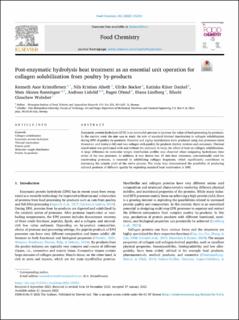| dc.contributor.author | Kristoffersen, Kenneth Aase | |
| dc.contributor.author | Afseth, Nils Kristian | |
| dc.contributor.author | Böcker, Ulrike | |
| dc.contributor.author | Dankel, Elin Katinka | |
| dc.contributor.author | Rønningen, Mats | |
| dc.contributor.author | Lislelid, Andreas | |
| dc.contributor.author | Ofstad, Ragni | |
| dc.contributor.author | Lindberg, Diana | |
| dc.contributor.author | Wubshet, Sileshi Gizachew | |
| dc.date.accessioned | 2022-08-01T12:15:58Z | |
| dc.date.available | 2022-08-01T12:15:58Z | |
| dc.date.created | 2022-03-03T11:52:17Z | |
| dc.date.issued | 2022-02-11 | |
| dc.identifier.issn | 0308-8146 | |
| dc.identifier.uri | https://hdl.handle.net/11250/3009640 | |
| dc.description.abstract | Enzymatic protein hydrolysis (EPH) is an invaluable process to increase the value of food processing by-products. In the current work the aim was to study the role of standard thermal inactivation in collagen solubilization during EPH of poultry by-products. Hundred and eighty hydrolysates were produced using two proteases (stem Bromelain and Endocut-02) and two collagen-rich poultry by-products (turkey tendons and carcasses). Thermal inactivation was performed with and without the sediment to study the effect of heat on collagen solubilization. A large difference in molecular weight distribution profiles was observed when comparing hydrolysate time series of the two proteases. In addition, it was shown that 15 min heat treatment, conventionally used for inactivating proteases, is essential in solubilizing collagen fragments, which significantly contributes to increasing the protein yield of the entire process. The study thus demonstrated the possibility of producing tailored products of different quality by exploiting standard heat inactivation in EPH. | en_US |
| dc.description.sponsorship | Financial support from the Norwegian Fund for Research Fees on Agricultural Products through the project “Precision Food Production” (no. 314111), and from the Norwegian Research Council through the project “Notably” (no. 280709) is greatly acknowledged. Internal financing from Nofima through the project “Peptek” is also greatly acknowledged. | en_US |
| dc.language.iso | eng | en_US |
| dc.publisher | Elsevier | en_US |
| dc.relation.ispartofseries | Food Chemistry;Volume 382, 15 July 2022, 132201 | |
| dc.rights | Navngivelse 4.0 Internasjonal | * |
| dc.rights.uri | http://creativecommons.org/licenses/by/4.0/deed.no | * |
| dc.subject | Collagen solubilization | en_US |
| dc.subject | Enzymatic protein hydrolysis | en_US |
| dc.subject | Thermal inactivation | en_US |
| dc.subject | Protein yield | en_US |
| dc.subject | Molecular weight distribution | en_US |
| dc.subject | Poultry by-products | en_US |
| dc.title | Post-enzymatic hydrolysis heat treatment as an essential unit operation for collagen solubilization from poultry by-products. | en_US |
| dc.type | Peer reviewed | en_US |
| dc.type | Journal article | en_US |
| dc.description.version | publishedVersion | en_US |
| dc.rights.holder | © 2022 The Authors | en_US |
| dc.source.articlenumber | 132201 | en_US |
| cristin.ispublished | true | |
| cristin.fulltext | original | |
| cristin.qualitycode | 1 | |
| dc.identifier.doi | https://doi.org/10.1016/j.foodchem.2022.132201 | |
| dc.identifier.cristin | 2007298 | |
| dc.source.journal | Food Chemistry | en_US |
| dc.source.volume | 382 | en_US |
| dc.source.issue | 382 | en_US |
| dc.source.pagenumber | 1-9 | en_US |
| dc.relation.project | Norges forskningsråd: 280709 | en_US |
| dc.relation.project | Norges forskningsråd: 314111 | en_US |
| dc.relation.project | Nofima AS: 12336 | en_US |
| dc.relation.project | Nofima AS: 202102 | en_US |

